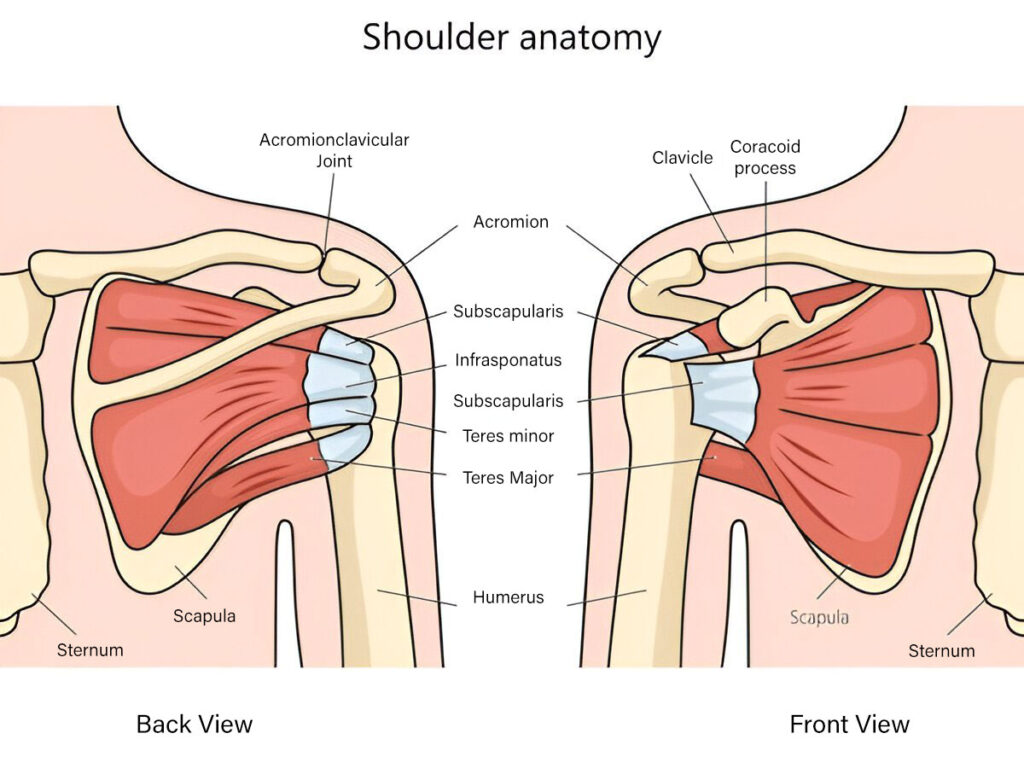
Shoulder Tendon Tear and Treatment
Ever gotten up and felt a sharp pain in your shoulder? It’s not just you. Shoulder tendon injuries are one of the most common reasons people see a physio. The shoulder is meant for movement, but that flexibility comes at a cost. When its tendons are strained, inflamed or torn, even daily tasks like getting dressed or lifting a bag can become painfully difficult.
At Rapid Physiocare, we want our patients to understand what’s really going on inside their shoulder and how proper treatment can speeds up the recovery process and it is the key to long term healing.
What Is a Shoulder Tendon and Why It Matter?
A shoulder tendon connects your shoulder muscles (like the rotator cuff) to the bone. These tendons work together to stabilize your arm so it moves smoothly. Overuse, sudden injury or even age-related wear can cause the tendon fibers to fray or tear leading to inflammation and pain.
When this happen, you might feel a subtle ache in the front of your shoulder, stiffness when reaching overhead, or sharp pain when lifting. If left untreated, these small injuries can worsen into partial or full shoulder tendon tears or even ligament damage, which take longer to heal.
Common Causes of Shoulder Tendon Pain or Tears
- Repetitive Movements: Sports like swimming, tennis or weight training put continuous strain on shoulder tendons.
- Sudden Injury: A fall, lifting something heavy or jerky movement can cause a shoulder ligament tear or strain.
- Poor Posture: Slouching or working long hours at a desk can create muscle imbalances and tendon overload.
- Age and Degeneration: As we age, tendons naturally lose elasticity, increasing the risk of microtears.
- Inflammation or Tendonitis: Ongoing irritation of the tendon, known as shoulder tendonitis, can weaken tissue over time.
Symptoms You Shouldn’t Ignore
- Persistent or sharp shoulder pain, especially when lifting the arm
- Pain radiating down to the upper arm
- Weakness or limited motion
- A clicking or grinding sensation in the joint
- Pain when sleeping on the affected side
If these sound familiar, don’t brush them off as “just a strain.” The sooner you get assessed, the sooner you’ll recover.
Shoulder Tendon Pain Treatment: What Works

Physiotherapy is pretty much the only game in town when it comes to sorting out shoulder tendon pain and getting some decent mobility back without needing to go under the knife. At Rapid Physiocare, we use a whole heap of techniques based on what the physiotherapist thinks is the best approach for your specific diagnosis and pain level.
1. Manual Therapy and Myofascial Release
Our physiotherapists use hands-on techniques to break up that tight fascia around the shoulder; this helps to improve the blood flow and release the build-up tension. That helps to relieve the pain quickly and also helps the tissues to heal properly.
2. Exercise to Strengthen the Right Bits
Once the inflammation has died down a bit, we’ll work with you to create an exercise program that strengthens the rotator cuff and gets the joint working smoothly again. The goal here is to build strength, not put the joint under any more strain than it has to be.
3. Electrotherapy
Using a bit of electrical stimulation helps to reduce the pain and inflammation and get the tissues healing faster. It’s particularly helpful if you’ve got shoulder ligament damage or tore a tendon. Proper early treatment can make a big difference.
4. Your Posture and Movement
Our physiotherapists will work with you to get your movement patterns back on track, so you don’t end up re-injuring the tendon. If you can get your shoulder alignment right, then that will make a massive difference to how you recover in the long term
5. Taping and Support
We use kinesiology tape to take some of the load off the injured tendon and to support it during the early stages of rehabilitation.
Recovery Time
It’s not a one-size-fits all situation; the amount of time it will take to recover will depend on how bad the injury is and how quickly you seek help.
Here is an average guide based on patient outcomes at Rapid Physiocare:
| Injury Type | Average Recovery Time |
| Mild tendon strain | 2–4 weeks |
| Partial tear or tendonitis | 6–10 weeks |
| Severe or complete tear | 3–6 months (may require specialist intervention) |
If you’re still wondering how long it takes for a strained shoulder muscle to heal, chances are most of the time it will be a few weeks before you’re back to full fitness. But if you regularly visit your physiotherapist and are consistent with the exercises, then you should be back to normal. But let’s be honest, if you skip sessions or delay treatment, it will take way longer than it needs to.
Shoulder Tendon Exercises You Can Try
It is important to always do your exercises under professional supervision.Incorrect form can result in your injury worsens.
Here are some physiotherapist-approved movements we prescribe during recovery:
- Pendulum Swings: Lean forward and let your arm hang freely, swinging in small circles. This lubricates the joint and reduces stiffness.
- Isometric Holds: Press your palm against a wall without moving the arm. Builds strength without straining the tendon.
- Scapular Squeezes: Pull your shoulder blades together to strengthen stabilizing muscles and improve posture.
- External Rotations with Band: Use a resistance band and rotate your arm outward while keeping your elbow close to your body.
- Wall Angels: Slide your arms up and down a wall while maintaining contact. Good for mobility and posture correction.
These exercises help restore flexibility and control to prevent re-injury.
When to Seek Professional Help
If your shoulder pain doesn’t improve in 2 weeks or you have swelling, weakness or night pain, it’s time for a professional assessment. A physiotherapist can differentiate between shoulder tendon tear, ligament injury or other joint conditions like bursitis or frozen shoulder.
At Rapid Physiocare, our team uses evidence-based methods, including ultrasound assessment and manual testing, to create a tailored treatment plan that addresses pain and root cause.
Your Recovery Starts Here
Ignoring shoulder pain never makes it go away; it just makes recovery longer. With proper diagnosis, guided physiotherapy and consistent follow-through, most tendon injuries heal completely, and patients return to normal activities pain-free.
At Rapid Physiocare, our physiotherapists combine expert knowledge with caring hands to get you moving again.
If shoulder pain is affecting your daily life, book a consultation today and start your journey to full recovery.



